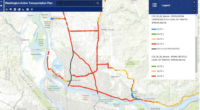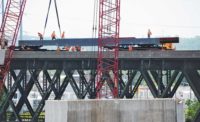Technology’s increasingly transformative influence on transportation—from the design and management of infrastructure assets to the expansion of intelligent and interconnected vehicles operating on them—underscored the Transportation Research Board’s 95th Annual Meeting, held on Jan. 10-14 in Washington, D.C.
Many of the more than 800 sessions and workshops presented current and potential applications for the preponderance of data now available from intelligent infrastructure systems, sensor-equipped vehicles, drones and third-party sources, such as other agencies and the private sector. Examples included pavement condition monitoring, snowplow-fleet deployment, and congestion management.
The emergence of sophisticated analytical tools also is helping DOTs fulfill performance management objectives established by the 2012 Moving Ahead for Progress in the 21st Century Act (MAP-21). A session on the application of performance-based practical design, for example, detailed how programs, such as Indiana DOT’s “Open Roads,” are using value-driven approaches that improve the safety and performance of roads and bridges for less cost, thereby maximizing funding resources.
While the volume of data is expected to grow exponentially as new, even more sophisticated technologies, such as autonomous vehicles, come on line, concerns remain about transportation agencies’ ability to optimize these resources. “We are good at measuring system performance, not our own efficiency and cost-effectiveness in how we manage it,” according to newly appointed Nebraska Roads Dept. Director Kyle Schneweis, who joined CEOs of other DOTs in a discussion on the future of performance management.
Maryland Secretary of Transportation Pete Rahn agreed, adding that DOTs “may have a lot of data but not a lot of information.” That makes it critical for agencies to identify performance information relevant to an agency’s customers—policymakers, system users and the public, he added.
“Tell people up front what they’ll get for their investment and show you’re delivering it,” advised Scott Bennett, director of the Arkansas State Highway and Transportation Dept., also noting the need to educate the public about the transportation system as a whole, not just the road in front of them. “It’s not easy to do that,” he said






Post a comment to this article
Report Abusive Comment